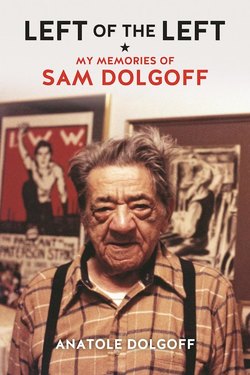Читать книгу Left of the Left - Anatole Dolgoff - Страница 6
На сайте Литреса книга снята с продажи.
2: Durruti and Me
ОглавлениеI was born April 8, 1937. On November 11 of that year, my father, Sam Dolgoff, addressed an open-air meeting held at Waldheim Cemetery in Chicago. Directly behind him stood the stone monument to Albert Parsons and three other anarchists falsely accused of planting a bomb that killed a number of policemen at a rally for the Eight-Hour Day in Haymarket Square. They were hanged for the crime in 1887 despite their innocence, in what has become known as the Haymarket Tragedy. My father shared the platform at this fiftieth anniversary of their martyrdom with Lucy Parsons, who had been a cofounder of the IWW. She was still beautiful, but frail and nearly blind by then, and she called out to my father, her old friend, “Sammy, Sammy!” and clung to his arm.
I have a photograph of him facing that small crowd, the monument behind him, wearing an overcoat against the Chicago wind: young, wild black hair swept back as best he could. It is the proudest moment of his life—the proof being he is wearing a suit and tie for the occasion. My father considered himself the direct spiritual descendant of the Haymarket anarchists and all who knew him well had no doubt that he was.
April 8, 1937, followed the death of Buenaventura Durruti by a few months. The leader of an anarchist column defending Spain against Francisco Franco’s fascist army, he took a bullet through the brain in the Battle of Madrid. Durruti held no rank and answered only to his unadorned name. He refused to be saluted. He slept amongst his comrades, in the field. My father was moved to tears by his death, and that is how I became the only person in the world named Anatole Durruti Dolgoff.
As you can see, I was born into a revolutionary family—and a revolutionary tradition.
Durruti: the son of a railway worker, short, stocky, and very strong; a kind man, “with a Herculean body, the eyes of a child in a half-savage face.”
Durruti: a man who “laughed like a child and wept before the human tragedy.”
Durruti: his coffin carried aloft by comrades through the streets of Barcelona, his path attended by over five hundred thousand mourners.
Durruti: whose “Column,” noted a comrade, “is neither militarily nor bureaucratically organized. It has grown organically. It is a social revolutionary movement.… The foundation of the Column is voluntary self-discipline. At the end its activity is nothing less than libertarian communism.”
Durruti: who said, “We carry a new world here, in our hearts.”
That was the essence of my father. He carried a new world in his heart—in the words of James P. Thompson “a world without a master and without a slave.” Call it foolish, call it hopelessly naive, call it visionary: that was the cause to which he dedicated his life.
Lofty stuff. The reality is I hated my name as a child. Bad enough Anatole—and with it the god-forbid connotation of femininity on the Lower East Side, reinforced by Danny Kaye’s swishy “I’m Anatole of Paris” routine in the hit film of the time, The Secret Life of Walter Mitty. Bad enough, Anatole. But, Durruti? Such a strange name out of nowhere, I was never quite sure of the spelling. The neighborhood Johnnies and Jimmies laughed at me when the teacher read it off in class, and my shameful secret was exposed.
“I hate my name,” I would announce dramatically to Mother, who took these things seriously: which is partly why I brought the subject up, to mischievously see her get ruffled.
“Sam, the boy hates his name,” she would announce, in hurt, baffled tones.
And my father would say simply, “The day will come when you will appreciate your name. It is a name of nobility and honor.”
Who needed that?
But the years have passed. And yes I have come to appreciate my name, deeply so. I have come to embrace it as a way of “coming home,” to do right by my heritage in my old age. How to do this? I will never be the man Buenaventura Durruti was, nor, frankly, the man my father was—warts and all. I am also not a professional historian. What I can do is tell stories: of my parents and their world, which spans seventy years of revolutionary activity; of the Wobblies and anarchists of my childhood—a colorful lot; of what it was like to grow up in a family whose ethics and politics ran against the grain. Hopefully it will add up to a history of sorts—one you will enjoy. Do not look for “objectivity.” To hell with it. I have read many such “objective” accounts of the anarchists and Wobblies, and few of them bear any resemblance to the flesh-and-blood human beings who broke bread with us or snored on our sagging couch. I’ve opted for the truth instead.
